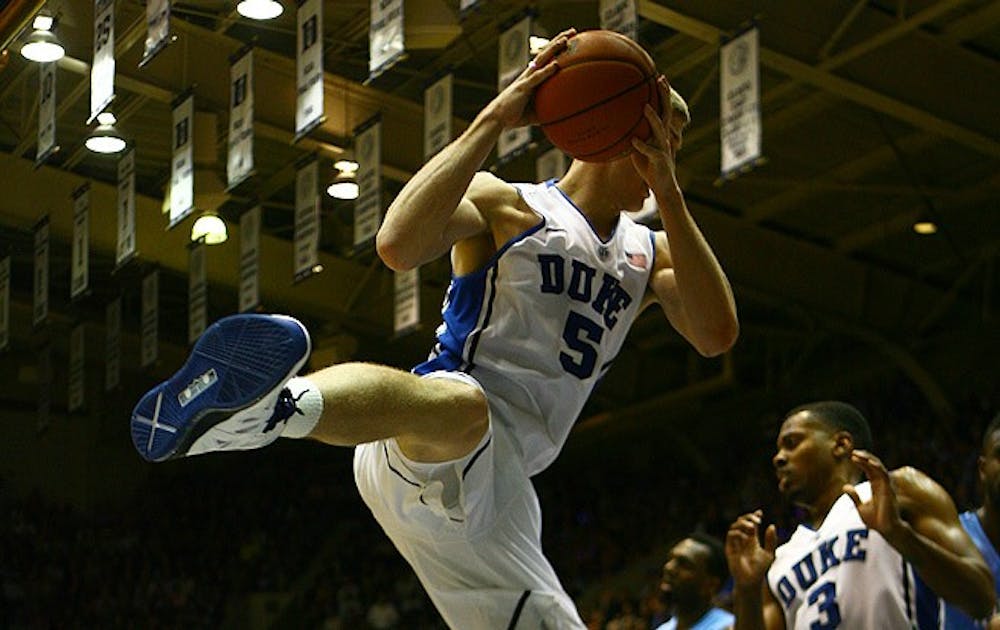“No one is going to be perfect,” Duke head coach Mike Krzyzewski told the media before Duke’s regular season finale against North Carolina. “You just try to play to your strengths.”
Krzyzewski was referring to is the Blue Devils’ rebounding—a statistic in which Duke ranks 213th in the nation with 33.8 per game.
“Overall we’ve been okay rebounding.... Otherwise we wouldn’t be [27-5],” Krzyzewski said.
What’s unclear is whether or not the Blue Devils can get six more wins and cut down the nets on April 8 with just “okay” rebounding.
Get even more coverage of Duke basketball in the 2013 NCAA Tournament
Just three of the last 20 Duke teams have averaged 34.0 rebounds or fewer per game—the 2005-06 squad lead by seniors J.J. Redick and Shelden Williams, which averaged only 33.4 per game.
Much like this current iteration of Krzyzewski’s club, one dominant rebounder carried the team—Williams averaged 10.7 rebounds per game in 2005-06 and Plumlee is at 10.2 per game this season—while no other player on either squad averaged six or more.
In 2005-06, Redick and Williams guided the Blue Devils to the top spot in the AP poll for much of the season and a No. 1 seed in the Tournament. What the seniors could not do, however, was lead the Blue Devils past No. 4 seed LSU—a team that snatched 40.2 boards per game behind Tyrus Thomas, Tasmin Mitchell and center Glen Davis.
Senior forward Mason Plumlee believes that this year’s Duke team has already found the key to avoiding a similar fate to the 2006 squad.
“I think having [senior forward] Ryan [Kelly] on the boards will help us,” Plumlee said. “Those statistics are a little skewed with Ryan having been out.”
There’s no doubt that the Blue Devils are a better rebounding team with Kelly on the floor. In the 13 games he missed, Duke averaged only 31.6 rebounds per game. When he played, the Blue Devils pulled down 34.9 per contest.
But Plumlee overstates the impact of Kelly’s absence. Out of the 18 teams in the Midwest region, Duke ranks 15th in rebounds per game, just behind potential Round of 32 opponent Creighton. However, removing the 13 Kelly-less games still does not push Duke ahead of the Bluejays.
Even if Kelly’s return does not completely solve Duke’s rebounding deficiencies, the backcourt may be able to help make up some ground.
“Coach is really big on that—guard rebounding,” sophomore point guard Quinn Cook said.
Cook has taken his coach’s emphasis to heart, checking in third on the team in rebounding with 3.9 per game, despite being the shortest player on Duke’s roster.
“Those long tip-out rebounds, the loose rebounds, the guards have to go get in there,” Cook said. “We have to try to go snag some ones ourselves in there with the trees.”
Cook, freshman Rasheed Sulaimon and junior Tyler Thornton put in extra effort on the boards Friday in Duke’s ACC Tournament loss to Maryland, as each guard scrapped for four or more rebounds apiece. In that game, the 6-foot-11 Kelly managed just three boards.
Not only does guard rebounding prevent second chances for the opponent on offense, it also kick-starts Duke’s own offense. “That’s basically when we’re at our best,” Cook said. “There’s no outlet, so we can be faster. Mason gets a chance to run and Ryan gets a chance to trail.” Regardless of the numbers, Cook thinks that the Blue Devils have improved their approach to rebounding as the season has progressed.
“Sometimes at the beginning of the season… we thought [Mason] could just get every rebound,” Cook said. “Rebounding is about toughness, and we have to get tough on the boards.”
Get The Chronicle straight to your inbox
Signup for our weekly newsletter. Cancel at any time.

